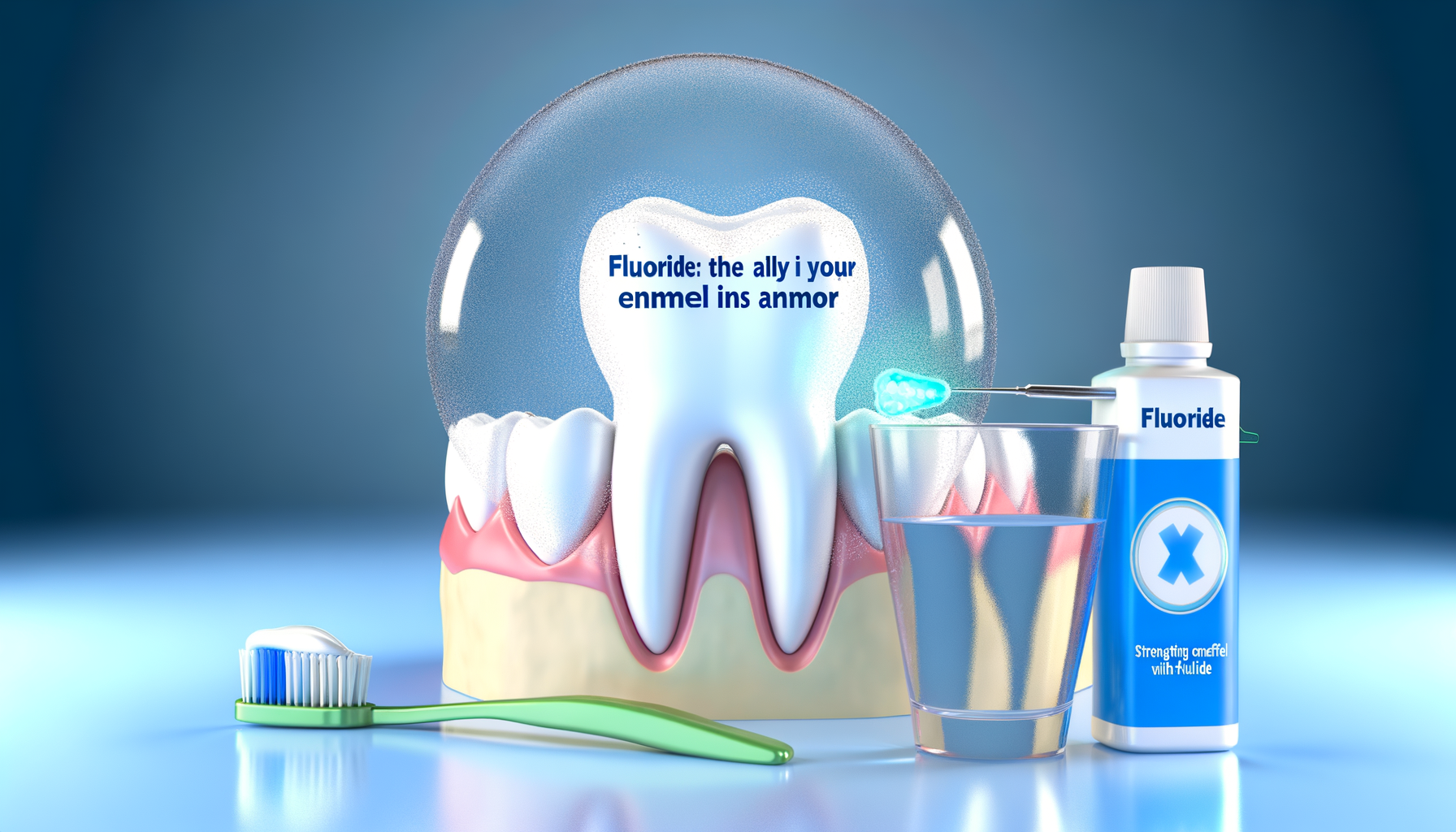Fluoride: The Ally in Your Enamel's Armor

Fluoride is like a superhero for your teeth. It's a natural mineral that helps make the outer layer of your teeth (called enamel) stronger and better at fighting off bad germs that can cause cavities. Think of it as a special shield that stops decay from happening and keeps your smile healthy and bright.
Understanding Fluoride: The Basics
Fluoride is a mineral that occurs naturally in many foods and water. It plays a critical role in dental health by strengthening tooth enamel and making it more resistant to decay. Understanding how fluoride functions can help individuals make informed decisions about their oral health.
A. What is Fluoride?
Fluoride is a natural mineral found throughout the earth's crust and widely distributed in the environment. It can be found in certain foods and is also added to dental products and some community water systems because of its benefits in preventing tooth decay.
B. The Role of Fluoride in Tooth Enamel Strength
1. Remineralization Process
Tooth enamel, though the hardest substance in the human body, is susceptible to demineralization from acids produced when bacteria in the mouth break down sugar. Fluoride helps to rebuild weakened tooth enamel through a process called remineralization, which fortifies teeth and helps to repair early stages of tooth decay.
2. Prevention of Demineralization
To enhance the remineralization process, fluoride can also prevent the demineralization of teeth in the first place. By binding to the enamel, fluoride creates a shield that is less soluble in acid, effectively providing the teeth with an added layer of defense.
C. Systemic vs. Topical Fluoride: Definitions and Differences
Two forms of fluoride – systemic and topical – provide benefits to teeth. Systemic fluoride is ingested and becomes incorporated into forming tooth structures, also providing topical protection because it is present in saliva, which continually bathes the teeth. Topical fluoride is applied directly to the tooth surface and includes toothpaste, mouth rinses, and professionally applied fluoride therapies.
The Systemic Benefits of Fluoride
A. Fluoride in Community Water Systems
1. Public Health Impact
The addition of fluoride to public water systems, known as water fluoridation, is a widely acknowledged public health practice. It is endorsed by numerous health organizations as one of the most effective strategies for reducing the incidence of dental caries (tooth decay) across populations.
2. Historical Success Stories
Communities that have implemented water fluoridation have seen remarkable reductions in the prevalence of tooth decay. This practice's inception dates back to the mid-20th century and continues to provide a preventive health measure that benefits all residents evenly.
B. Fluoride Supplementation: Who Needs It?
Fluoride supplementation can be beneficial for individuals in areas where the public water supply is not fluoridated or for those using certain types of private water systems. Healthcare providers can advise whether those, especially children, may need supplements based on their risk of tooth decay and exposure to fluoride.
C. How Systemic Fluoride Works in the Body
1. Fluoride in Childhood
For children under six years, systemic fluoride helps in the development of permanent teeth, making them more resistant to bacteria and acids in the mouth. This early intervention can lay the foundation for a lifetime of better dental health.
2. Long-term Benefits for Adults
Adults also benefit from systemic fluoride, which continues to fight tooth decay through its presence in saliva. This ongoing process provides a constant defensive agent against the challenges our teeth face daily.
Learn more about fluoride's role in dental health on the CDC's webpage.
Topical Fluoride: Direct Protection for Your Teeth
A. Fluoride Toothpaste: Everyday Armor for Enamel
The use of fluoride toothpaste is the most convenient and widely available method to apply fluoride topically. Brushing with fluoride toothpaste at least twice a day has been universally recommended by dental professionals to help protect teeth against cavities and to strengthen enamel.
B. Professional Fluoride Treatments
1. The Procedure
Professional fluoride treatments, typically administered during dental check-ups, involve the application of high-concentration fluoride gel, foam, or varnish. These treatments, which can be more potent than over-the-counter products, provide an immediate topical benefit and help safeguard the enamel against acid attacks.
2. Expectations and Results
Patients can expect professional fluoride treatments to be a quick, painless procedure that delivers a concentrated dose of fluoride directly to the teeth. This treatment has been shown to reduce the risk of caries in children and adults, making it an essential component of routine dental care for those in high-risk categories for dental decay.
C. The Importance of Regular Dental Visits for Topical Fluoride Application
Regular dental visits are vital not only for receiving professional fluoride treatments but also for comprehensive evaluations of dental health. These appointments allow dentists to tailor fluoride needs based on the individual's risk of decay, lifestyle, and oral hygiene habits, thus offering a personalized approach to dental care within the Salt Lake City community.
Combatting Tooth Decay with Fluoride
A. The Decay Process and Fluoride's Role in Prevention
Cavities are formed when the bacteria in the mouth ferment carbohydrates and produce acid, leading to enamel demineralization. Fluoride intervenes by enhancing the teeth's resistance to acid and by aiding in the remineralization of early stages of decay. This active role that fluoride plays is pivotal in maintaining a cavity-free mouth.
B. Benefits of Fluoride for High-Risk Individuals
Individuals with a higher risk of dental decay—for example, those with less saliva flow due to medical conditions or medications, those who consume diets high in sugars and carbs, and those who have had previous cavities—can benefit significantly from fluoride. Adjusting fluoride intake and ensuring adequate fluoride protection is particularly important for safeguarding their oral health.
Addressing Misconceptions and Controversies
A. Common Misconceptions about Fluoride
Misconceptions about fluoride are abundant and can often dissuade individuals from utilizing this effective dental health tool. Myths such as fluoride being unnatural or causing harm at the levels used for dental health have been repeatedly debunked by scientific research and expert consensus.
B. Scientific Evidence Supporting Fluoride Safety and Efficacy
1. Debunking Myths
The overwhelming scientific evidence points to the safety and efficacy of fluoride in preventing dental decay. Not only is fluoride considered safe for use in community water systems and dental products, but it also has proven benefits for oral health across various age groups.
2. Expert Opinions and Research Findings
Experts from reputable institutions such as the American Dental Association (ADA) and the Centers for Disease Control and Prevention (CDC) advocate for the use of fluoride, backing it with extensive research that underscores its importance in oral health regimens.
Learn more about the benefits of fluoride from the American Dental Association.
Ensuring a Secure Use of Fluoride in Your Dental Care Regimen
A. Ideal Fluoride Levels and Safe Usage
To harness the full benefits of fluoride for dental health without overexposure, it is essential to understand and maintain the ideal fluoride levels. For most individuals, drinking fluoridated water and brushing with fluoride toothpaste provides an adequate amount of fluoride. People should be cautious of using multiple fluoride sources, and parents should supervise the use of fluoride-containing products by children to prevent ingestion of excessive amounts.
B. The Role of Dental Professionals in Fluoride Education
Dental professionals play a crucial role in educating patients on the appropriate use of fluoride, based on their specific oral health status and requirements. Tailored advice can range from choosing the right dental products to the frequency of professional fluoride treatments—an integral part of preventive oral care especially emphasized by dental practices committed to patient education.
C. Personalized Dental Care: Addressing Individual Needs and Concerns
Given the unique nature of each person's oral health, the approach to fluoride use should be personalized. Dental professionals should provide individual consultations to discuss the most beneficial use of fluoride, considering factors such as age, dietary habits, and current oral health situation. This personalized approach ensures that patients receive the right level and type of fluoride to protect against dental decay.
Conclusion
Fluoride serves as a powerful ally in the fight against tooth decay and is an essential element in strengthening the enamel, the outer armor of teeth. Understanding the basics, ensuring the safe use of fluoride, and debunking misconceptions are all crucial steps toward maintaining optimal dental health. Whether through fluoridated community water, fluoride supplements, or topical treatments, the consistent and correct use of fluoride can benefit dental health significantly.
Making informed choices about fluoride intake and dental care, with guidance from dedicated dental professionals, can lead to a healthier mouth and a more confident smile. We should embrace fluoride for its proven benefits and integrate it responsibly into our daily dental hygiene practices to keep our teeth strong and resilient against decay.
For additional information about fluoride and oral health, or to consult with local dental experts in Salt Lake City, Utah, visit the
CDC's frequently asked questions about community water fluoridation.
By staying informed and proactively caring for our teeth, we can ensure that fluoride remains our enamel's formidable ally, guarding against the dangers of decay and contributing to our overall well-being.
Take the step to protect your smile with the shield of fluoride. Reach out to us today and learn more about how this powerful ally can fortify your enamel and keep your teeth strong against decay.


Connect With Us on Facebook
Areas We Serve
Downtown Salt Lake City
84103, 84116, 84104, 84101, 84111, 84102, 84112, 84113, 84108, 84105, 84115, 84104, 84103
Business Hours
- Monday
- -
- Tuesday
- -
- Wednesday
- -
- Thursday
- -
- Friday
- -
- Saturday
- Closed
- Sunday
- Closed
All Rights Reserved | South Temple Dental
Dentist in Downtown Salt Lake City, Utah
